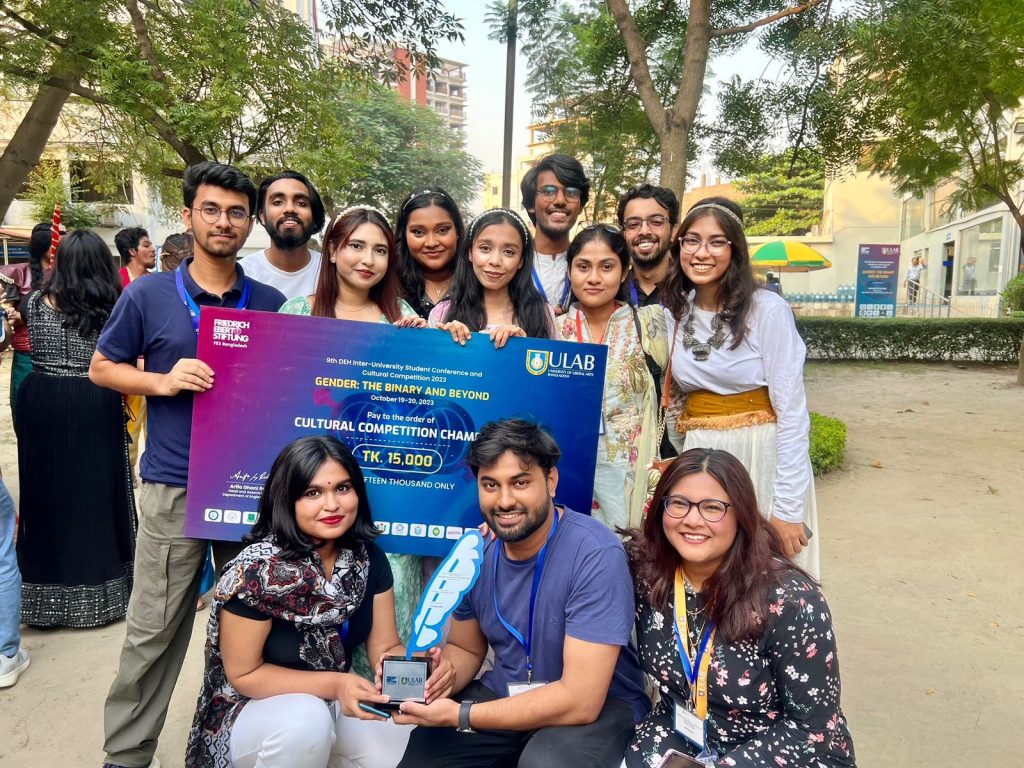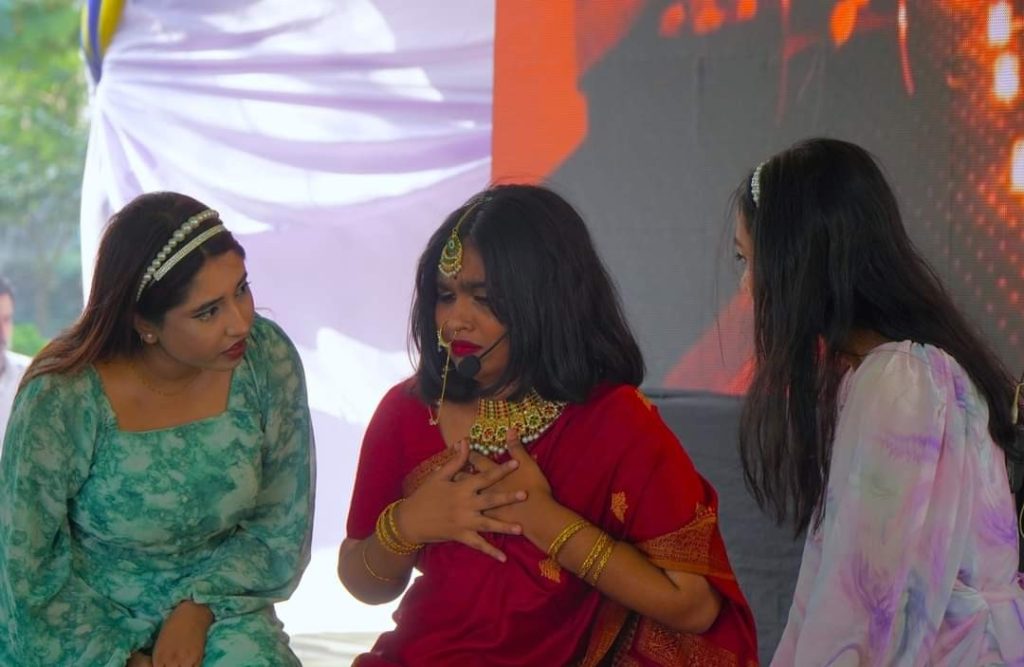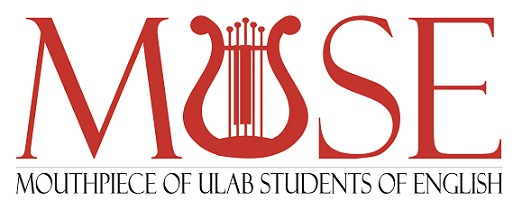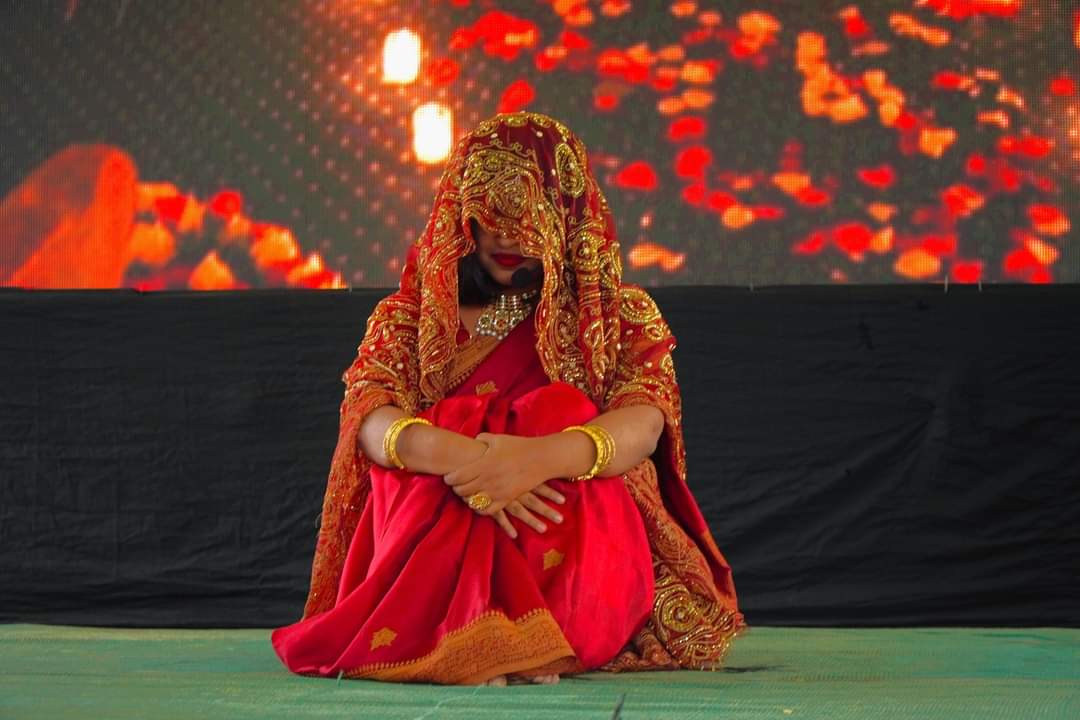Tarannum Ahmed
For this issue of MUSE, we interviewed ULAB’s Masters student Quazi Farhina Hassan, one of the brightest minds of the DEH. During her time here, she has proved herself to be an exceptional script-writer, contributing to the success of multiple plays and dramas. In this interview, we can see a completely candid side of hers: sharing her inspirations, her future plans, and the different experiences she has had over the years.
Your script for “Beyond the Mirror” recently won the 9th Inter-University Student Conference and Cultural Competition, please tell our readers about your experience.
This is a very interesting story. The script I wrote for the Inter-Uni competition was basically one I had written as a course assignment, which also ended up winning in the Curriculum Integration program. Muntasir Mamun sir was the one who first approached me with the idea that he wanted to take my story for the cultural program as the story goes well with the theme, that is, “Gender: Beyond the Binary”. So, initially, I thought I just had to help them with the script and watch the performers play their parts. But little did I know that I was going to be the one to play the main role. If you are aware, I also participated in the 8th Inter-University cultural program, where we ended up getting the runner-up position. The highlight of that event was probably me dressing up as a boy. Luckily, this time, I got to play as someone’s wife. Haha. From writing the script to buying costumes and props to being a part of the drama itself- I have to admit that it was very pressurizing and challenging for me. But at the end of the day, when we got the first prize, I realized it was all worth the hard work and mental breakdowns.

Apart from the big win at the 9th Inter-University, what are some of your other achievements inside or outside of ULAB?
There’s no big achievement outside of my university YET. But we all can hope for the best. When I first enrolled at DEH, I didn’t participate much in extra-curricular activities. And immediately after my first semester, we had to face this global lockdown. I wasn’t active in online classes, let alone being spontaneous in club activities or other competitions. So, from 2022, after the reopening of all the educational institutes, I finally had the privilege to work on my creative side. The CI program laid down the path for me to create my first academic movie ever. The project “The Lotus Door” was my first ever short academic film that stood second-runner up in the program. And this very project opened a new portal for me and helped me discover what I actually want to do in life. Apart from CI, I made a few films for my department, especially for the commencement programs, and a few personal projects. I also run a page called “Tea For Banshees” where I post the contents I create. I request everyone to give it a glance!
After completing your Masters, what is next in line for both the academic, and for the artist in you?
Now, that’s hard to answer. I am still skeptical about what I want to do in the academic line. PhD is always an option, so, I guess, after Master’s, I will try to sign up for higher studies. And for my inner artist, who is currently being lazy on her couch, I plan to pursue a career in the line of media.
What book or film would you say inspired you to begin your journey of film-making?
I was never interested in movies. I would spend most of my time reading books and writing short stories, which were full of grammatical mistakes and poor vocabulary. “A Rose for Emily” by William Faulkner was the short story that inspired me to begin my journey of film-making. Other than this, the movies “Shutter Island” and “The Virgin Suicides”, the series “Sherlock”, ” Black Mirror”, “Love, Death and Robots”, and other short films of small production houses, enhanced my passion a bit more. From my choice of movies, you can already guess what kind of genres I am into.
When it comes to coming up with a new idea for a script, what is your creative process?
I am spontaneous when it comes to script writing. I never follow the traditional structure of a script or a screenplay, because, I personally believe that it’s the visual that matters here, not the write-up. And the funniest part is, during shooting the shots, I never follow the script. And during editing, it changes again. So, my script is always going through changes. Like me, my scripts are dramatic and chaotic.
Considering the theme for this issue of MUSE is ‘nostalgia’, I want to ask you how often your scripts contain your stories or certain glimpses of your past.
I think I have never revealed this, but my stories DO have some parts that I have taken from real life events. My life is pretty interesting; a rollercoaster ride that helps me to travel through different dimensions of life. So when I create a work, I knit my own miniature multiverse. I think it’s always going to be a secret, and I don’t plan to expose which part of my film shows glimpses of my past.
What are the biggest obstacles that you have come across when managing or organizing a new production and how do you usually deal with them?
Firstly, patience. I easily lose my calm and end up panicking if I don’t get to finish my pending task. Secondly, the PEOPLE. It’s like I have created my personal club where I have kept my favorites, and pick a few from there every time I come up with a new movie idea. Thirdly, the time. I am still a student, and so are my club members, and we hardly get much time to create quality content. All the movies I have created so far were done in a rush because our time was limited, and we got curfews as well. And lastly, budget, however I am still working on it.

There are many of your works on ULAB’s official page such as the latest comedy skit on how students, alumni and faculty get together. On Paper Canoe’s page as well you often publish a lot of literary pieces. You were also voted Author of the Month multiple times by them. However, is there any particular theme you would like to work around more?
I almost forgot about the Paper Canoe part. Yes, I wrote a few pieces for Paper Canoe, because, since I was a literature major, I needed to practice writing. I also ended up becoming one of the sub-editors of MUSE. Then there was a pause because I felt I was no longer passionate about writing. And about the theme- it is always macabre, thriller, mystery, dystopian fiction and horror. I am basically into everything except romance or domestic fiction.
Alongside your own experience at ULAB, as a student of DEH, what academic aspects of it have helped you in the development of your creations?
Curriculum Integration programs, the stage dramas, competitions, and the opportunity to create films as an extension of my thesis. Also, a small shout out to the clubs- Paper Canoe and English Language Club.
If you had to leave any messages or suggestions for DEHians who are interested in filmmaking like you, what would you tell them?
I would say, don’t be traditional. Traditional is for the beginners, yes, but most people never exceed the boundary to explore different themes. I understand people tend to stick to their signature style, but, sometimes, to create or enhance your own signature dish, you need to taste other items as well. Now, let me quote Francis Ford Coppola- “Good acting and writing are the oxygen and hydrogen of cinema. If you don’t have either of them, it will be hard to have a good movie. And if you have both of them, then other weaknesses, such as poor production design, can be compensated for”.
Where do you see yourself in the future and how would you like to remember yourself from this time of your life?
In my imagination, the future looks pretty bright, where I’m in the Academy Awards, holding an Oscar or a Golden Globe with pride. I am not sure if this dream is going to come true, but I’m manifesting it hard. So, yes, I do want to see myself in Hollywood, as a renowned Oscar worthy filmmaker. And if not, then I have other personal backup plans.
Now, how would I like to remember myself…I don’t think I see myself as anything big yet. Understand that I’m still an average student in the academic line, and an amateur artist, making low-budget unpaid films. I wouldn’t even compare myself with the professionals now because I know I still have things to learn. The achievements you are seeing are just baby steps, and products of my procrastination. But, I’m almost there. So, to the future self, if you ever see this, know that I am trying. We got this.


